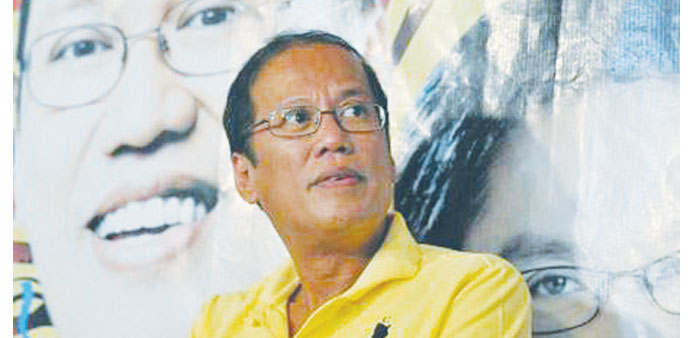Manila Times/Manila
President Benigno Aquino may have had noble intentions when he approved the implementation of the Disbursement Acceleration Programme (DAP) but the controversial scheme may yet lead to his downfall, according to the Integrated Bar of the Philippines (IBP).
Vicente Joyas, IBP president, yesterday said that if the Supreme Court (SC) declares DAP unconstitutional, the president may be held liable for technical malversation, a solid ground for impeachment.
“That (technical malversation) is a ground for impeachment. They may be prosecuted for technical malversation and COA (Commission on Audit) shall require the return of the funds (released through DAP),” Joyas told Manila Times.
Last month, the IBP filed the fifth petition against DAP and asked the SC to order COA to conduct an immediate audit of the programme and disallow all public money spent through it.
Other petitions were separately filed by former Iloilo representative Augusto Syjuco, Manuelito Luna, Jose Malvar Villegas and the Philippine Constitution Association (Philconsa). Militant groups also filed a similar case before the High Court.
Joyas clarified that the IBP is not one of the proponents of the People’s Initiative campaign for the enactment of a budget reform law being pushed by former chief justice Reynato Puno. He said his group is more inclined at present to try out the judicial route to having DAP scrapped and declared illegal.
A magistrate of the High Court confirmed that criminal charges can be filed against Aquino, Budget Secretary Florencio “Butch” Abad, Executive Secretary Paquito Ochoa and Senate President Franklin Drilon over DAP.
The Justice, who spoke on condition of anonymity, claimed that due to the strength of the arguments in various petitions against DAP, the government officials may face charges of malversation or even plunder.
However, he said that the ruling of the SC en banc will determine the fate of Aquino and his men and whether or not they should be held criminally liable.
The magistrate said that the transfer of funds from one branch of government to another is illegal “per se.”
“The president is empowered under the 1987 Constitution to realign funds. But the big question is can he transfer it from the Executive Department to the Legislative Department?” the justice asked.
He explained that a government official who is accountable for keeping public funds may be found guilty of technical malversation once he or she transfers the funds from one office or one purpose to another.
“An ordinary government official who shall transfer funds from one hand to another is clearly committing technical malversation,” he told Manila Times.
The SC is set to deliberate on November 11, 2013, whether or not it will issue a temporary restraining order stopping the implementation of DAP.
Malacanang had admitted that it has released 9% of the total DAP budget to legislators, but maintained that there was no misuse of funds.
In 1977, the High Court nullified a similar budget programme introduced by former President Ferdinand Marcos. The tribunal voided a portion of Presidential Decree 1177 that gave Marcos leeway in realigning government funds because it “allows the president to override the safeguards, form and procedures prescribed by the Constitution in approving appropriations.”
“The nation has not recovered from the shock, and worse, the economic destitution brought about by the plundering of the Treasury by the deposed dictator and his cohorts. A provision which allows even the slightest possibility of a repetition of this sad experience cannot remain written in our statute books,” the Court en banc, then led by the late chief justice Claudio Teehankee Sr, said. But Joyas said DAP can be nullified even without a precedent case.
“DAP can be voided for being unconstitutional not on the basis of (any) case . . .” he said.
Former Budget secretary Benjamin Diokno described the petition being pushed by the IBP and other groups before the SC as “the first best hope” to win the battle against DAP.
Anti-DAP petitioners argued that funds used for DAP officially contained in the National Budget Circular of the Department of Budget and Management (DBM) cannot be considered as savings because “there could not be savings in the middle of a fiscal year, especially if the projects or programmes for which these funds were allocated by law, have not been completed, discontinued or abandoned.”
“The appropriations law becomes the law of the land, a product of the collective effort of the representatives of the people and the different government agencies. Not even Congress who passed it can alter the same, without undergoing the same tedious process of enacting a law. Such is the wisdom of our Constitution,” the petitioners said.
Records showed that fund releases through DAP also breached the P130bn mark as of last month.
“These funds that the DAP and the DBM 541 call as ‘savings’—the unreleased appropriations and unobligated allotments—are not actually savings following the strict formulation of the General Appropriation Laws passed by Congress through the years,” the petitioners added.
Besides Aquino, Ochoa and Abad were named as respondents in the petition which also sought a temporary restraining order on the DAP while their petition is being heard.
Malacanang previously said DAP was created in October 2011 to gather “savings” from slow-moving projects and use them for more important ones. Officials said DAP can be likened to the stimulus fund during the previous administrations which were used to spur economic growth. Election lawyer Romulo Macalintal also said DAP is unconstitutional because it is not in the General Appropriations Act, unlike the Priority Development Assistance Fund (PDAF).

Aquino: under scrutiny
